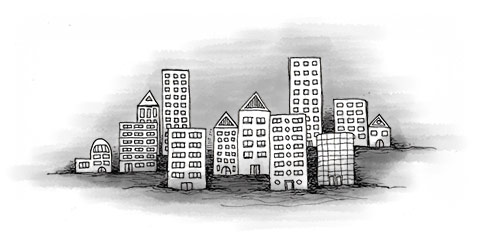Most landlords use an official standard rental contract (contract, bail), but you can also find contracts written by landlords themselves. Especially in the second case, take your time and read the contract carefully to ensure everything is clear. You can usually buy a standard rental form at a real estate agency to see how it looks.
The contract must be signed by both the tenant and landlord. There should be two copies, one for each party. A normal contract will include the following:
- start date and duration of the rent period
- use of the rent space (private, professional, mixed) and habitable surface (m2)
- rent amount, in addition to terms of payments and revisions
- additional charges (list) and taxes that the tenant has to pay to landlord
- deposit (if any)
- contract termination terms
Rental period
Typically, rental contracts run for three years. During the contract period (durée du contrat) you cannot be asked to leave, even if the owner wishes to sell the flat. Typical agreements are automatically renewable for another 3-year period, unless the landlord gives notice 6 months prior the end of period (check your contract as terms differ).
The contract period can be shorter then three years ( un bail de courte durée), but legally, it must be for a minimum of one year. If the rental period is shorter than 3 years it is probable that the landlord does not want to rent the place afterwards.
A tenant is usually free to leave whenever he or she wants after giving notice as specified in the contract (usually 3 months). You will need to do this by registered letter with acknowledgement of reception ( lettre recommandée avec accusé de réception) - keep a copy.
You can leave before the end of the notice period, but will have to pay the rent for the whole period. If relations with your landlord are good and you get someone to move in when you leave, you might be able to avoid paying your notice after you have left.
Deposit
Most landlords ask for a deposit (caution, dépôt de garantie) of one or two months rent, you should avoid anything more than this. This deposit is refunded when you leave - minus any deductions for damages to the property. Legally, it must be refunded within two months after the date the tenant gives back the keys.
Some landlords try to make deductions without good reason, so bear in mind that:
- Deterioration of the flat (especially carpet, wall paper, paint) and its contents through normal use or ageing cannot be considered as damage. However, ensure their maintenance is carried out during your rental because small repairs are usually your responsibility. You are also usually required to clean everything at the end of the lease.
- The landlord has to justify the amount deducted from the deposit with invoices for required reparations.
- In case of disagreement, you can defend yourself. Complaints can be made with your local Prefecture de Police or to the DDE ( Direction départementale de l'équipement), a state agency for accommodation issues Be aware, however, that this is very time-demanding procedure.
- You also may be able to negotiate the conditions concerning the return date of the deposit or try to use it to pay the final month's rent. Naturally, it is preferable to get any additional agreement in writing.
Guarantees
It is common for landlords to ask for additional guarantees (guaranties), especially if you are not in full-time employment or your income is not more than 3 times higher then the rent. For students, this is usually parental guarantee (as a letter from your parents, se porter garant). If you cannot provide this, you may have to get your bank or even a friend to sign on your behalf that they will pay whatever is owed for the remainder of the contract.
Initial and final inventories
In France, this document about the inventory (état des lieux) is a very formal and important piece of the contract. An inventory is established together with the landlord when you move in; this details the condition of the flat and lists its contents.
The second part of the état des lieux is completed when you leave. Two copies must be signed by the tenant and landlord, each keeping an original. The inventory can be also established by an official third party (hussier), with fees usually being split between the tenant and landlord.
It is very important to check all details of the initial inventory. All existing problems, damages and defects must be noted, otherwise the landlord can make you responsible for them and retain part or all of your deposit. If you discover problems after moving in, you have one month to include these in the inventory statement (in the case of central heating until its first use). In this case, send a registered letter to your landlord and make sure that your comments are included.
Flats are not usually furnished, but if so, ensure all items are present and their state corresponds to the description in the inventory. If an item is described as 'nouveau', it must be really new or recently installed. If it is not new, insist on a different term. Check all electrical appliances and utilities are in working order. Don't accept a verbal guarantee that things will be fixed later, get it written down in the contract or fixed immediately. Make sure you find out who will be paying for the maintenance of things like boilers, heating, etc. Some landlords have maintenance contracts and the fees are already part of your charges.
Before making structural or other changes you should ask the landlord for permission. If you do not, you may later be required to change the property back to its original state (or have amounts deducted from your deposit).
Utilities and service charges
Depending on the landlord, utility expenses (charges) and community fees may or may not be included in the rent. Community fees generally cover the costs of the concierge (if any), cleaning of common areas, general maintenance, lift usage, rubbish collection and sometimes one or more of the utilities (mostly water and heating, if provided from a central system).
Just be sure to ask which items you will have to pay for individually (heating can be a particularly large expense). Usually, charges are paid monthly and the amount is based on the last year cost + expected increase; then, once a year (usually at December/January), an adjustment according to real cost over the past period is made.
Rent
Rent (loyer) usually excludes charges and the deposit and is normally paid monthly, at the beginning of the month (e.g. in advance). According to French law, rent can be increased only once a year. Review conditions should be specified in the contract. Increases are usually calculated on the base of a construction cost index ( Indice du coût de la construction) published annually by the government (see www.insee.fr )




